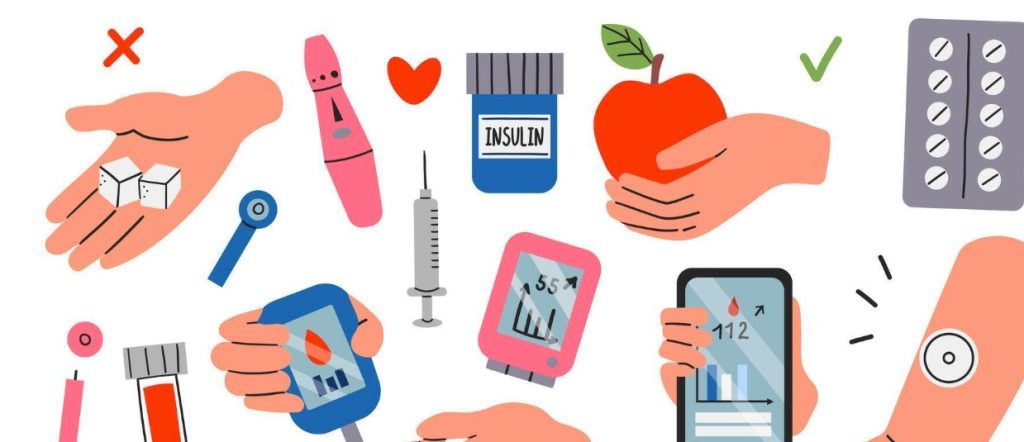In today’s fast-paced lifestyle, diabetes has become a common health issue that affects not only older people but also children and young adults. Diabetes, also known as madhumeh, is a condition in which the body fails to properly convert glucose into energy.
Glucose is the body’s main source of fuel. When we eat food, it is broken down into glucose, which enters the bloodstream and reaches the body’s cells. To convert glucose into energy, a hormone called insulin is required, which is produced by the pancreas.
Diabetes occurs when:
- The body stops producing insulin, or
- Insulin is produced in insufficient amounts, or
- The cells are unable to use insulin effectively.
As a result, glucose levels in the blood rise abnormally high, a condition known as high blood sugar. If this continues for a long time, it can damage vital organs such as the eyes, kidneys, heart, nerves, and skin.
Types of Diabetes
Diabetes can be classified into several types, but the major categories are:
1. Type-1 Diabetes
- Commonly found in children and young adults.
- The immune system mistakenly attacks and destroys the pancreas cells that make insulin.
- As a result, insulin production completely stops.
- Patients with Type-1 diabetes need insulin injections for life.
2. Type-2 Diabetes
- The most common form, affecting nearly 90% of diabetes patients worldwide.
- The body produces insulin, but the cells do not respond to it properly, a condition called insulin resistance.
- Earlier, it was mostly seen in people above 40, but now even young people and children are affected due to lifestyle changes.
- Major risk factors include obesity, poor diet, stress, and lack of exercise.
3. Gestational Diabetes
- Occurs only in pregnant women.
- Due to hormonal changes during pregnancy, blood sugar levels may rise.
- Usually, it goes away after childbirth, but such women have a higher chance of developing Type-2 diabetes later in life.
4. Other Types
- Prediabetes: Blood sugar is higher than normal but not high enough to be diabetes. If ignored, it may develop into Type-2 diabetes.
- Monogenic Diabetes: Caused by genetic mutations.
- Secondary Diabetes: Can occur as a result of other illnesses or long-term medication use.
Causes of Diabetes
The causes may vary, but some common factors include:
- Genetics: Family history increases risk.
- Unhealthy diet: Excessive oily, fried, fast food, and sweets.
- Obesity: Reduces the effectiveness of insulin.
- Physical inactivity: Sitting for long hours or lack of exercise.
- Stress: Mental stress can disturb hormones, raising blood sugar.
- Other health issues: High blood pressure and cholesterol are often linked to diabetes.
Symptoms of Diabetes
Early signs are usually mild, but identifying them in time is crucial:
- Frequent urination
- Excessive thirst
- Unexplained weight loss
- Feeling very tired
- Slow healing of wounds
- Blurred vision
- Frequent infections (skin, gums, urinary tract)
- Numbness or tingling in hands and feet
If these symptoms continue, a blood sugar test should be done immediately.
Complications of Diabetes
If untreated, diabetes can cause serious health problems such as:
- Heart disease and stroke
- Kidney failure
- Vision loss or blindness
- Nerve damage (neuropathy)
- Foot ulcers and infections
- Complications during pregnancy
Treatment of Diabetes
Diabetes cannot be completely cured, but it can be managed. With proper diet, medication, and lifestyle changes, patients can live a normal life.
1. Lifestyle changes
- Regular exercise (walking, yoga, cycling)
- Maintain healthy weight
- Avoid smoking and alcohol
- Reduce stress with meditation or relaxation techniques
2. Healthy Diet
- Eat vegetables, pulses, salads, and fruits
- Avoid excess sugar, fried food, and junk food
- Limit rice and potatoes
- Drink sufficient water
3. Medicines & Insulin
- Type-1 diabetes: Lifelong insulin injections are necessary.
- Type-2 diabetes: Can be controlled with medicines in the early stage, but insulin may be needed if the condition worsens.
4. Regular Check-ups
- Monitor blood sugar regularly
- Get routine health check-ups
- Keep blood pressure and cholesterol under control
Prevention of Diabetes
Type-1 diabetes cannot be prevented, but Type-2 diabetes can be avoided with the right habits:
- Eat a balanced and healthy diet
- Exercise at least 30 minutes daily
- Avoid smoking and alcohol
- Maintain proper weight
- Get enough sleep and manage stress
Diabetes is a serious but manageable disease. It can affect multiple organs, but with early detection and proper treatment, its impact can be controlled. Regular monitoring, a healthy diet, exercise, and medical guidance allow patients to live a healthy and normal life.
Note: This article is for informational purposes only. If you notice any symptoms of diabetes, consult a doctor immediately and follow medical advice for treatment.

